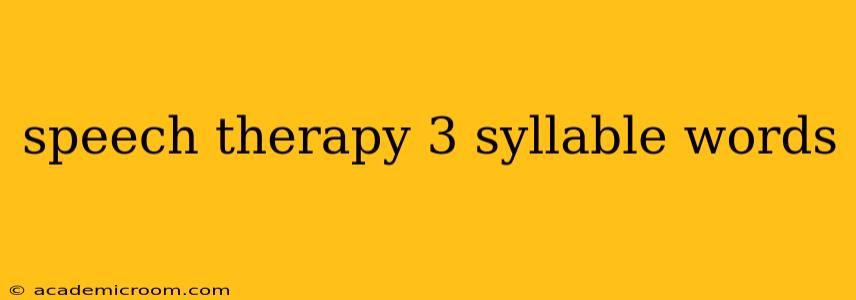Three-syllable words represent a significant milestone in speech development. Successfully articulating these words demonstrates a child's growing phonological awareness, vocabulary, and overall language skills. This article delves into the challenges and strategies involved in teaching and learning three-syllable words within a speech therapy context. We'll explore various techniques, resources, and considerations for successful intervention.
What are the Challenges of Three-Syllable Words?
Three-syllable words present several challenges for children learning to speak:
-
Increased Syllable Complexity: The additional syllables increase the demands on working memory, requiring the child to hold and process more phonetic information simultaneously.
-
Stress Patterns: Three-syllable words exhibit diverse stress patterns (e.g., in-ter-esting, un-der-stand-ing). Incorrect stress placement significantly impacts intelligibility.
-
Consonant and Vowel Combinations: These words often include complex consonant blends and vowel combinations that can be difficult to articulate accurately.
-
Motor Planning: Precise coordination of the articulators (tongue, lips, jaw) is crucial for producing the correct sounds and syllable sequences.
-
Auditory Processing: Correctly perceiving and distinguishing the individual syllables within a word is essential for accurate pronunciation.
What are Some Examples of Three-Syllable Words?
Choosing appropriate words is crucial for effective therapy. Here are some examples categorized by syllable stress patterns, gradually increasing in complexity:
Simple Three-Syllable Words:
- ba-na-na
- el-e-phant
- cam-e-ra
More Complex Three-Syllable Words:
- un-der-stand
- in-ter-est-ing
- com-mu-ni-ca-tion
- a-qua-tic
- oc-to-pus
How Can I Teach My Child Three-Syllable Words?
Effective strategies focus on breaking down the words into manageable parts and providing ample opportunities for practice and feedback.
-
Syllable Segmentation: Begin by clearly segmenting the syllables, clapping or tapping along with each syllable. Visual aids like color-coding each syllable can be beneficial.
-
Multi-Sensory Approach: Engage multiple senses. For example, use manipulatives (blocks, counters) to represent each syllable.
-
Visual Support: Pictures or flashcards can help children associate the word with its meaning and visual representation.
-
Repetition and Practice: Consistent practice is key. Incorporate the words into games, songs, and everyday conversations.
-
Positive Reinforcement: Praise and encouragement are essential to build confidence and motivation.
-
Breaking Down Complex Words: For more challenging words, focus on one syllable at a time. Master one syllable before moving onto the next.
-
Use of Technology: Apps and online resources provide interactive games and exercises for practicing three-syllable words.
-
Focus on Specific Sounds: If the child has difficulty with certain sounds, incorporate targeted drills to improve articulation.
What are Some Activities for Practicing Three-Syllable Words?
Here are a few engaging activities:
-
Syllable Clap: Clap along as you say the word, emphasizing each syllable.
-
Picture Matching: Match pictures of objects to their corresponding three-syllable words.
-
Sentence Building: Create simple sentences using three-syllable words.
-
Word Games: Play games like "I Spy" or rhyming games incorporating three-syllable words.
Are there Resources Available for Teaching Three-Syllable Words?
Numerous resources exist to support speech therapy for three-syllable words. Consult with a speech-language pathologist for personalized recommendations. They can assess your child's specific needs and create a tailored plan.
What are the Signs that My Child Needs Speech Therapy?
If you have concerns about your child's speech development, consult a speech-language pathologist. Early intervention is crucial for maximizing progress. Signs that might indicate a need for speech therapy include:
- Significant difficulty articulating words, especially longer words.
- Limited vocabulary for their age.
- Difficulty understanding complex instructions.
- Problems with fluency and rhythm of speech.
This article aims to provide valuable information; however, it's crucial to remember that professional guidance from a speech-language pathologist is essential for individualized assessment and therapy planning. They possess the expertise to diagnose and address any speech difficulties effectively.
